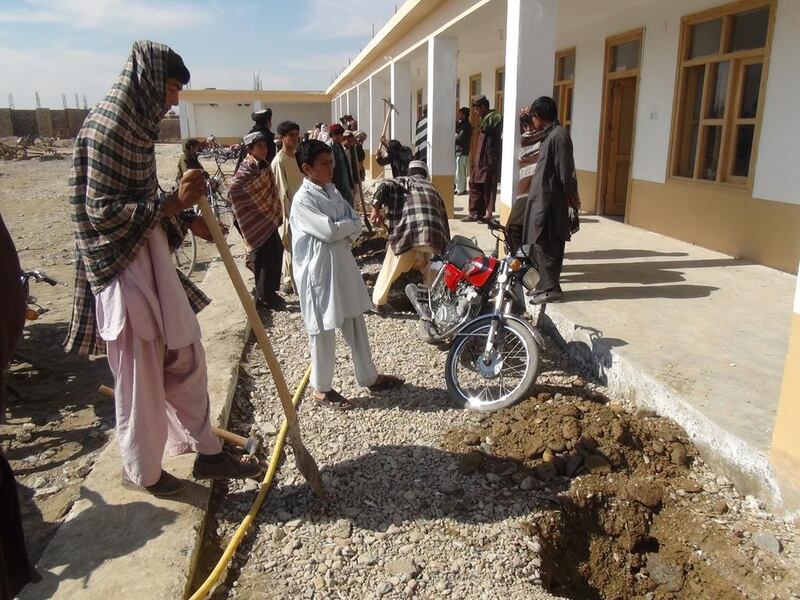Lady Richards is co-founder & chief executive of the Afghan Appeal Fund, a charity that builds schools in Afghanistan. She is also the wife of General Sir David Richards, a former commander of the International Security Assistance Force (ISAF). The Afghan Appeal Fund has released a book called Afghanistan Revealed: Beyond the Headlines, with proceeds going towards the construction of schools.
People are just crying out for education in Afghanistan. I think it’s something that communities can do fairly easily, if they get some financial help. You then have the challenge of teachers and training teachers; it’s not that easy.
Education was forgotten to begin with because people were distracted by the war. Now, there are huge numbers of children going back to school, including girls. But there’s still a massive amount to do.
In a way, it’s something we all take for granted, a school. Schools are something we can build because some very good agencies are already working in Afghanistan.
Our current project is in Shin Kalay, a village in Helmand province in southern Afghanistan. We are rebuilding a school that was demolished in 2008. Dr Mohammad Khan Kharoti, who we are building the school with, has his own charter schools called Green Village Schools. He had built a school in the village, but it was bulldozed to the ground and everything was stolen. International troops asked him, ‘Who’s done this to your school?’
Dr Kharoti said, ‘I can tell you exactly who did this: It was illiteracy.’
We are now rebuilding that school and we have assurances and involvement from the grass roots upwards, from the villagers, the village elders and the governor of Helmand province. This creates security for the school. It is beautifully built and shows what is possible.
Dr Kharoti has even met local Taliban who say that they are behind the school.
He said to them, ‘Life moves on. If your wife is ill who would you like to visit your wife? A male doctor or a female doctor?’ Of course, they had to agree that you want a female doctor to visit your wife. So, he said, ‘that’s why I need to educate girls.’
They trust Dr Kharoti because he originally came from the village, and his logic is very easy to understand. He just loves Afghanistan and it’s people. As a doctor, when he returned to his village, it shocked him to see the children in his old village harvesting opium. They appeared dazed.
In Helmand, the entire village has been involved with the school - we had people queuing up to work on the site. I think the involvement of local people is vital.
Our current school project has 24 classrooms, two sets of latrines, and two wells. All schools need security walls to prevent unwanted attention; our local construction design incorporates the security wall as the external wall of the school.
The school is wider than just a place where children go to learn to read and write. It is about the whole community: it has been used for a local wedding. I think it’s a universal passion for parents to see their children doing better. And a school also brings health benefits to the village through education; like clean water for washing their hands in.
Dr Kharoti was walking past a nearby house when the father came out and said, ‘You’ve won the war.’ ‘What do you mean I’ve won the war?” Dr Kharoti asked. He said, ‘It’s the war in my house. My daughter wants to go to school. And she’s won the war!’
It shows how society can slowly evolve through the children. And you can see the excitement of that little girl who can now go to school and learn to read.
I think it’s important we finish the school before international combat troops leave. It’s two thirds finished. We still need to raise a lot more money to finish it. Obviously, you can do basic things, but Dr Kharoti would like a computer lab and a library so children can then progress to the advanced education centre he runs in Lashkar Gah.
Children are already attending the school; it’s a hive of activity. There is a girl’s half and a boy’s half, with separate entrances and a dividing wall. There are about 790 boys and 370 girls. There are more students wanting to come from surrounding villages.
The main reaction to my work back in England was that people found it very odd. I realized that they didn’t really understand what we were trying to do in Afghanistan. There are many people who think the West is trying to do too much. But I don’t think you can go into a country and ignore its people. People also seem to forget that the Afghan people are our allies and that they have endured 35 years of war.
Perhaps the biggest threat to Afghanistan is the lack of education, which will provide the foundations needed for the long term economic development of the country.
But we do need help.
foreign.desk@thenational.ae





